All of our pupils follow the national Curriculum for Excellence (CFE) which provides a holistic, child-centred approach to teaching and learning. Staff are skilled at bringing learning to life in a useful, meaningful and personalised manner. You can read about Curriculum for Excellence on the Education Scotland website.
A broad, balanced, fun curriculum is offered, promoting skills for learning, life and work. Everyone who works with the pupils shares a responsibility to develop skills in Literacy, Numeracy and Health and Wellbeing and offer the appropriate support for each individual. This ensures pupils learn in a way that works for them, at a pace they can cope with, to reach success but also to ensure they are challenged in their learning and that they develop new skills.
Every pupil has an Individual Learning Plan (ILP) which promotes the development of core skills. Pupils (where appropriate) and families are consulted on priorities for development and ILPs are built by teachers in partnership with families. All pupils are encouraged to become as independent as possible, developing their self-esteem and confidence within and beyond the classroom environment.
Principles
- Willowbank School will plan and deliver an appropriately differentiated curriculum for every pupil, based on Curriculum for Excellence and National Qualifications.
- All pupils will have opportunities to achieve and all achievements will be celebrated.
- The curriculum will be broad based, age appropriate and will ensure progression.
- Parental involvement will be encouraged to contribute to the setting of priorities and the assessment of the effectiveness of the curriculum for their own child
- The curriculum is based around the needs of the whole young person – education, care and medical needs.
Methodology
Children and young people in Willowbank School are most likely to learn:
- In a safe, stimulating environment
- Through structure and routines such as morning group, snack and lunch times.
- Within fun, relevant themes providing opportunities to work with others .
- If they are presented with achievable tasks relevant to their needs.
- Using high quality resources are used and there is appropriate adult involvement.
- When involved in individual, group and whole school activities.
- Where emphasis is on practical experience through enterprising teaching.
- When ICT is embedded into the curriculum.
It is essential that families are fully involved in their child’s teaching and learning process, and that skills being developed in school are, where appropriate, carried over into the home. Families are actively involved in the determination of their child’s annual targets and receive end of term and regular reports on pupil attainment.
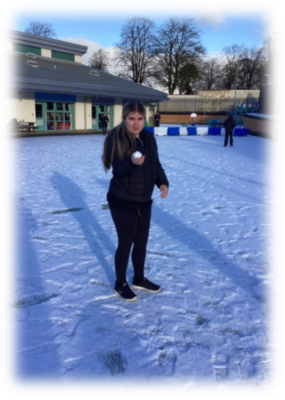
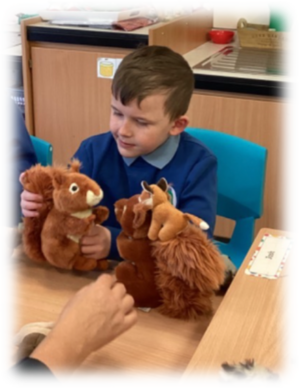
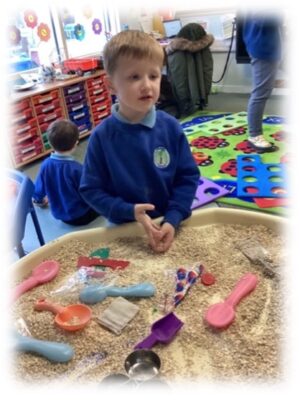
The importance of play is valued throughout all stages of the school.
Social Education Visits
Every class regularly makes trips into the local community, or even further afield. On these occasions, pupils are given opportunities to use the skills they have been learning as part of their daily school work, e.g. reading social sight words in real situations, shopping in local supermarkets, enjoying a snack in a café with local residents, using the public library or visiting local parks and amenities. Social outings also have a significant role to play in moves towards a more inclusive society which accepts the individuality of all and promotes fairness, equality, citizenship and social inclusion for all groups.
At the start of the school year, we will ask you to consent to regular community outings for your child, with medical and emergency contacts being requested. When trips are planned we will tell you in advance, saying where and when these will take place and you can let us know if you don’t want your child to take part. Your child will need suitable outdoor clothing and, for any visits that are further afield, residential or of a more adventurous nature, we will again ask for your consent.
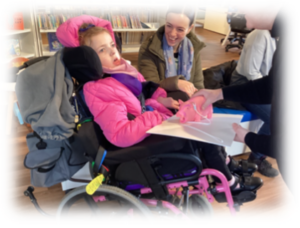
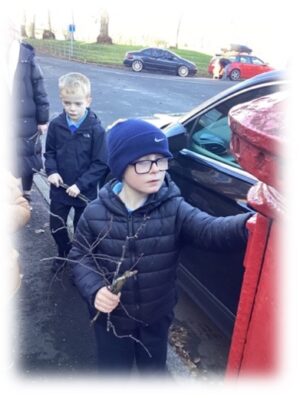

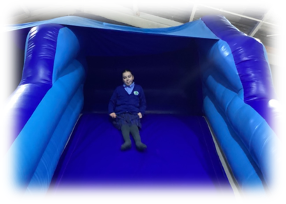
Pupils enjoying social outings in a range of places.
Swimming and Hydrotherapy
Some pupils use the pool for Hydrotherapy sessions. Pupils with physical difficulties can relax, exercise limbs and experience easier movements in water. Swimming also enables pupils with established physical skills to develop these skills, to develop confidence and self-esteem and to experience and develop co-operation.
Citizenship
The learning environment of Willowbank supports and encourages all pupils to be effective members of the school community which will enable them to acquire and practice the skills needed to play a participative role in society.
Sensory Curriculum
Some pupils may have sensory needs which result in a reluctance to interact with a range of textures, materials and environments. The outcome of this can be that learning opportunities are reduced as the children are unable to explore the world around them. A sensory assessment can be completed and sensory tactile sessions are designed to support pupils and encourage voluntary interaction.
Complimentary Therapies
Over the past few years, we have developed out use of complimentary therapies to enhance the existing curriculum, including pet therapy, equine therapy and Rebound Therapy.
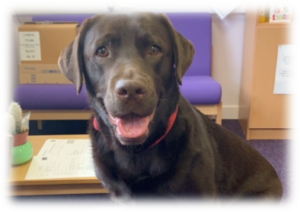
Pet Therapy is a firm favourite amongst most pupils!
Total Communication
We use a Total Communication approach. This means we use a variety of ways to support each young person in the way they best communicate. This includes Makaton signing, Eye Gaze, use of symbols, and use of objects of reference. This allows all learners regards of their needs and support to be able to communicate in a way that is appropriate for them. Willowbank is a Makaton Friendly school, having achieved our Silver Award. We are currently working towards achieving Gold. Mr Campbell Caldwell, DHT, and Mrs Higgins, PT, are both Makaton Tutors and provide training to staff, partners and families.
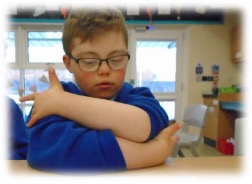
Many pupils are highly skilled at using Makaton signs and symbols to communicate.
Movement Opportunities Via Education (MOVE)
There is a variety of equipment which allows staff to offer balanced, structured programmes of physical activities. Some pupils have a MOVE programme which is a structured activity based programme, designed to help pupils acquire increasing amounts of physical independence needed for sitting, standing and walking. We are a MOVE Centre of Excellence. Mrs Murray, Principal Teacher, is a MOVE Coordinator and Trainer and provides training to staff.

Pupils accessing the curriculum through movement opportunities.
Enterprise
Enterprise plays a very major part in the curriculum. Pupils are given opportunities to take on roles and responsibilities in real life, active, practical, hands-on tasks. Our school café, Thanks a Latte, is well established, and pupils confidently embrace responsibilities during this work experience activity, which is often attended by parents and partner agencies.
Eco School
Willowbank is the first school to hold Seven Green Flags. Eco is very much part of our school ethos and there is a strong sense of community spirit with all parties including children, staff, parents, multi-disciplinary team and the local/wider community.
Outdoor Learning
Willowbank access the outdoors regularly and this is an important part of the curriculum. We are fortunate to have a large playground and sensory garden which the pupils get to
use on a daily basis along with the Kay Park directly across from the school. Pupils are afforded the opportunity to transfer skills taught in school to a variety of environmental contexts. Activities have included visits to Dumfries House, and partnerships with Duke of Edinburgh. We work closely with the Dean Park Ranger Service and pupils enjoy learning experiences with the Rangers both in the school and at the Dean Park.
Assembly
Assembly allows us to come together to celebrate events, share success and achievement, showcase learning and practice the skills of listening and turn-taking. We have a mixture of department and whole school assemblies, both in the Hall and through Zoom. Rev Cameron joins us for certain events in the school calendar to offer his chaplaincy.
Extra-Curricular Activities
We have a number of activities available during lunch time and after school for our pupils. We have regular input over the year from Active Schools who bring fun sports opportunities to the pupils. In addition to the development of individual physical skills, this is also an opportunity to develop personal and social skills and there are opportunities indoors and outdoors when pupils can experience physical activity in a safe environment.
Secondary Education and Senior Phase
At approximately, 11-12 years our pupils move into the Secondary Department. This consists of two stages: S1-S3 (Secondary) and S4-S6 (Senior Phase)
Pupils in the early stages of secondary continue to develop Literacy and Numeracy skills by continuing to follow Curriculum for Excellence. Pupils also study SQA National Qualifications, which provide challenge and enjoyment and encourage pupils to take opportunities to develop interests and talents through personalisation and choice of units.
The focus for all pupils in the Secondary Department is developing skills for independence. This includes in personal care, communication and social interactions, which will set them in good stead for the transition into adulthood.
Work Experience
The young people are involved in school based work experience and in work experience that has been arranged outwith school with our community partners. This allows pupils experience of the wider community, building their confidence and self-esteem and an opportunity to develop new relationships within the community.
College
Pupils will have the opportunity to attend Ayrshire College if appropriate, alongside peers from Hillside School. Lecturers from Ayrshire College deliver aspects of the Secondary curriculum working co-operatively with school teaching staff.

Secondary pupils at Ayrshire College.
Sensitive Aspect of Learning
Willowbank School supports pupils to develop their understanding of themselves and others around them. Curriculum for Excellence provides opportunities to study potentially sensitive aspects of learning, such as Relationships, Sexual Health and Parenthood, and drugs and alcohol awareness.
The RSHP programmes at Willowbank School are specific and proportionate to the needs of individual pupils. This can vary from how to look after a baby in the early years to puberty and sexual relationships in the upper school. All of our RSHP programmes are LGBT+ inclusive.
Where families wish further information on these areas of the curriculum, they should contact the Head Teacher.
Religious and Moral Education
We believe that studying Religious and Moral Education (RME) in line with Curriculum for Excellence helps children become successful learners, confident individuals, effective contributors and responsible citizens.
The basis of RME in Willowbank is an appropriate ethos in which children are valued and loved, and respect for self and others is fostered. Attention is paid to special events, festivals and themes from all major world religions.
Religious Observance
The school chaplain, Rev David Cameron, also provides support and encouragement to staff and families. For many pupils, families and staff, this approach is wholly consistent with their own faiths.
However, you can choose to withdraw your child from religious observance and we will respect your wishes, making arrangements for your child to undertake an alternative activity. If you wish to do so, please contact the Head Teacher. Your child will never be disadvantaged as a result of withdrawing from religious observance.
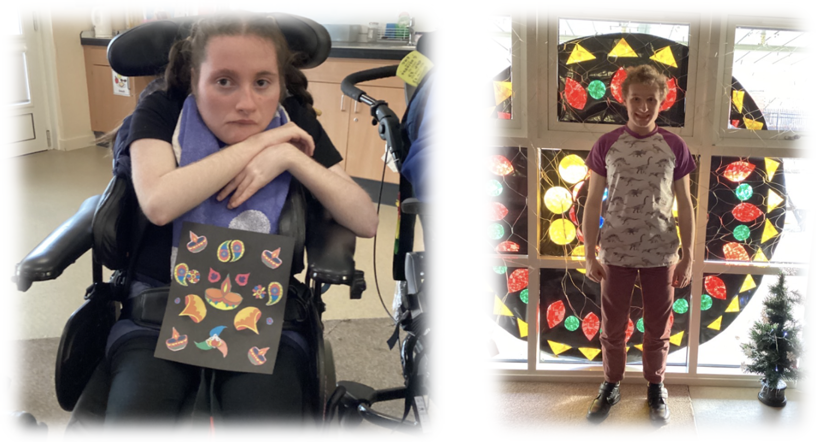
Pupils exploring aspects of religious festivals as part of an SQA National 1 Unit studying Life in Another Country.

